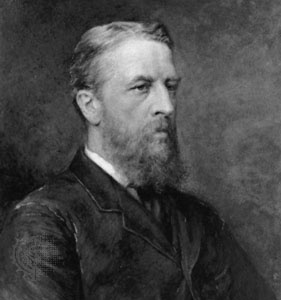Devonshire, Spencer Compton Cavendish, 8th duke of, marquess of Hartington, earl of Devonshire, Baron Cavendish of Hardwick
British statesman
born July 23, 1833, Lower Holker, Lancashire, Eng.
died March 24, 1908, Cannes, Fr.
 British statesman whose opposition to the Irish Home Rule policy of his own Liberal Party caused him to assume (1886) the leadership of the Liberal Unionist Party and to become increasingly identified with the Conservatives. On three occasions (1880, 1886, and 1887) he declined the office of prime minister.
British statesman whose opposition to the Irish Home Rule policy of his own Liberal Party caused him to assume (1886) the leadership of the Liberal Unionist Party and to become increasingly identified with the Conservatives. On three occasions (1880, 1886, and 1887) he declined the office of prime minister.Entering the House of Commons in 1857, Lord Hartington was secretary of state for war from February to July 1866. During William Gladstone's (Gladstone, William Ewart) first prime ministership, he was postmaster general (1868–71), directing the nationalization of the British telegraph services, and afterward was chief secretary for Ireland. In January 1875, when Gladstone temporarily retired from politics, Hartington became the Liberal leader in the House of Commons. In Gladstone's second administration (1880–85), Hartington was secretary of state for India until December 1882, and then he returned to the war office. He shared the responsibility for assigning General Charles George (“Chinese”) Gordon to evacuate British troops from the Sudan in 1884, but he repeatedly and unsuccessfully urged the Cabinet to hasten the expedition to relieve Gordon.
Throughout this period, Hartington led the Cabinet opposition to conciliating the Irish nationalists. Gladstone's attempt to placate him through his younger brother Lord Frederick Cavendish, who was made Irish secretary May 4, 1882, resulted in the tragedy of Lord Frederick's murder in Dublin two days later. When Gladstone became premier once more in February 1886, Hartington rejected his chief's conversion to full Irish Home Rule and became the leader of the new Liberal Unionist Party. In June he secured the defeat of Gladstone's Home Rule Bill in the House of Commons and the fall of the government. Robert Arthur Talbot Gascoyne-Cecil, 3rd marquess of Salisbury, leader of the Conservative Party, on finding that his majority in the House of Commons depended on the Unionists, offered to serve in a ministry headed by Hartington, who, however, declined this proposal twice (July 1886 and January 1887).
In September 1893 the duke of Devonshire (as he had become in 1891) led another defeat of a Gladstonian Home Rule bill, this time in the House of Lords. Refusing the foreign secretaryship in 1895, he served in Lord Salisbury's third ministry (1895–1902) and in the subsequent Conservative government of Arthur James Balfour (1902–05) as lord president of the council, with responsibility for the school system. Strongly believing in free trade, he resigned over that issue in October 1903. Among the Unionists, his free traders were outnumbered by those who supported the imperial protectionism of Joseph Chamberlain, the colonial secretary; and in May 1904 the duke resigned as Liberal Unionist Association chairman in favour of Chamberlain.
Additional Reading
Bernard Holland, The Life of Spencer Compton, Eighth Duke of Devonshire, 2nd ed., 2 vol. (1911), written by his private secretary; and Patrick Jackson, The Last of the Whigs (1994), discuss his life and work.
- Shenzhou spaceflights
- Shenzong
- Sheopur
- Shepard, Alan B., Jr.
- Shepard, Francis P
- Shepard, Sam
- Shepherd of Hermas
- shepherds, adoration of the
- shepherd's purse
- Shepherdstown
- Shepherd, William Robert
- Shepp, Archie
- Sheppard, Jack
- Sheppard, Kate
- Sheppard, Mel
- Shepparton
- Sheppey, Isle of
- Shepstone, Sir Theophilus
- Shepway
- sheqel
- sherardizing
- Sheraton, Thomas
- sherbet
- Sherbo, Vitaly
- Sherbro Island